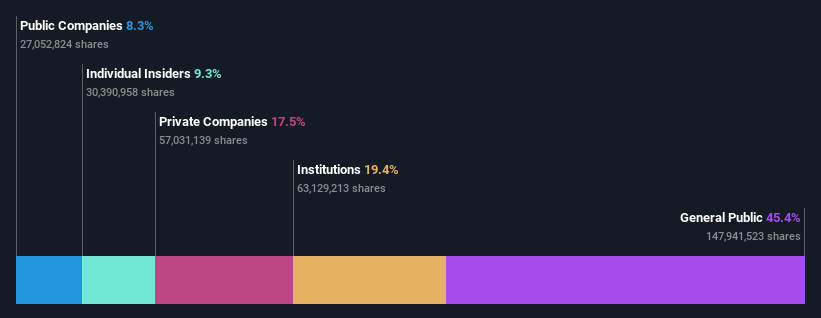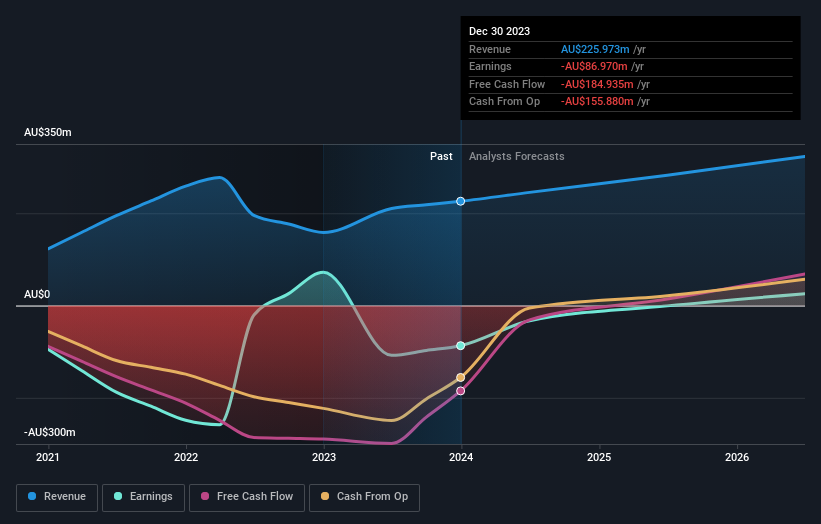- Australia
- /
- Hospitality
- /
- ASX:PBH
PointsBet Holdings Limited's (ASX:PBH) market cap dropped AU$18m last week; individual investors who hold 45% were hit as were institutions

Key Insights
- The considerable ownership by retail investors in PointsBet Holdings indicates that they collectively have a greater say in management and business strategy
- The top 12 shareholders own 50% of the company
- 19% of PointsBet Holdings is held by Institutions
Every investor in PointsBet Holdings Limited (ASX:PBH) should be aware of the most powerful shareholder groups. The group holding the most number of shares in the company, around 45% to be precise, is retail investors. In other words, the group stands to gain the most (or lose the most) from their investment into the company.
Following a 11% decrease in the stock price last week, retail investors suffered the most losses, but institutions who own 19% stock also took a hit.
Let's take a closer look to see what the different types of shareholders can tell us about PointsBet Holdings.
See our latest analysis for PointsBet Holdings

What Does The Institutional Ownership Tell Us About PointsBet Holdings?
Institutions typically measure themselves against a benchmark when reporting to their own investors, so they often become more enthusiastic about a stock once it's included in a major index. We would expect most companies to have some institutions on the register, especially if they are growing.
As you can see, institutional investors have a fair amount of stake in PointsBet Holdings. This implies the analysts working for those institutions have looked at the stock and they like it. But just like anyone else, they could be wrong. If multiple institutions change their view on a stock at the same time, you could see the share price drop fast. It's therefore worth looking at PointsBet Holdings' earnings history below. Of course, the future is what really matters.

Hedge funds don't have many shares in PointsBet Holdings. Looking at our data, we can see that the largest shareholder is Philadelphia Trading, Inc. with 12% of shares outstanding. Meanwhile, the second and third largest shareholders, hold 9.4% and 5.2%, of the shares outstanding, respectively. In addition, we found that Samuel Swanell, the CEO has 2.0% of the shares allocated to their name.
A closer look at our ownership figures suggests that the top 12 shareholders have a combined ownership of 50% implying that no single shareholder has a majority.
While studying institutional ownership for a company can add value to your research, it is also a good practice to research analyst recommendations to get a deeper understand of a stock's expected performance. There are plenty of analysts covering the stock, so it might be worth seeing what they are forecasting, too.
Insider Ownership Of PointsBet Holdings
The definition of an insider can differ slightly between different countries, but members of the board of directors always count. The company management answer to the board and the latter should represent the interests of shareholders. Notably, sometimes top-level managers are on the board themselves.
Insider ownership is positive when it signals leadership are thinking like the true owners of the company. However, high insider ownership can also give immense power to a small group within the company. This can be negative in some circumstances.
Shareholders would probably be interested to learn that insiders own shares in PointsBet Holdings Limited. In their own names, insiders own AU$14m worth of stock in the AU$151m company. Some would say this shows alignment of interests between shareholders and the board, though we generally prefer to see bigger insider holdings. But it might be worth checking if those insiders have been selling.
General Public Ownership
With a 45% ownership, the general public, mostly comprising of individual investors, have some degree of sway over PointsBet Holdings. While this size of ownership may not be enough to sway a policy decision in their favour, they can still make a collective impact on company policies.
Private Company Ownership
It seems that Private Companies own 18%, of the PointsBet Holdings stock. Private companies may be related parties. Sometimes insiders have an interest in a public company through a holding in a private company, rather than in their own capacity as an individual. While it's hard to draw any broad stroke conclusions, it is worth noting as an area for further research.
Public Company Ownership
It appears to us that public companies own 8.3% of PointsBet Holdings. This may be a strategic interest and the two companies may have related business interests. It could be that they have de-merged. This holding is probably worth investigating further.
Next Steps:
I find it very interesting to look at who exactly owns a company. But to truly gain insight, we need to consider other information, too. Case in point: We've spotted 3 warning signs for PointsBet Holdings you should be aware of.
If you would prefer discover what analysts are predicting in terms of future growth, do not miss this free report on analyst forecasts.
NB: Figures in this article are calculated using data from the last twelve months, which refer to the 12-month period ending on the last date of the month the financial statement is dated. This may not be consistent with full year annual report figures.
New: Manage All Your Stock Portfolios in One Place
We've created the ultimate portfolio companion for stock investors, and it's free.
• Connect an unlimited number of Portfolios and see your total in one currency
• Be alerted to new Warning Signs or Risks via email or mobile
• Track the Fair Value of your stocks
Have feedback on this article? Concerned about the content? Get in touch with us directly. Alternatively, email editorial-team (at) simplywallst.com.
This article by Simply Wall St is general in nature. We provide commentary based on historical data and analyst forecasts only using an unbiased methodology and our articles are not intended to be financial advice. It does not constitute a recommendation to buy or sell any stock, and does not take account of your objectives, or your financial situation. We aim to bring you long-term focused analysis driven by fundamental data. Note that our analysis may not factor in the latest price-sensitive company announcements or qualitative material. Simply Wall St has no position in any stocks mentioned.
Have feedback on this article? Concerned about the content? Get in touch with us directly. Alternatively, email editorial-team@simplywallst.com
About ASX:PBH
PointsBet Holdings
Provides sports, racing, and iGaming betting products and services through its cloud-based technology platform in Australia.
Undervalued with high growth potential.
Similar Companies
Market Insights
Community Narratives




